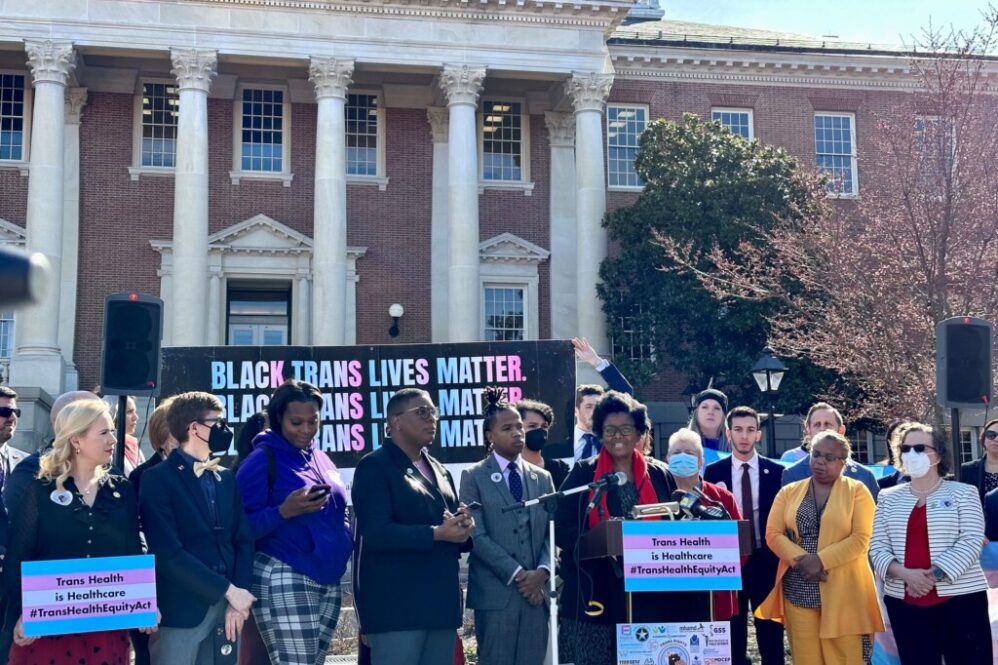MARYLAND MATTERS: After a bill to expand Medicaid coverage for gender-affirming health care failed late in the 2022 General Assembly session, advocates and lawmakers rallied Tuesday in Annapolis for the passage of the measure this year.
House Bill 283, the Trans Health Equity Act, has 57 sponsors in the House of Delegates and 13 sponsors in the Senate.
“This is a mission of love, but I am not alone,” the bill’s chief House sponsor, Del. Anne Kaiser (D-Montgomery), said at an afternoon rally, gesturing to her many cosponsors. “…We also have dozens of other colleagues planning to vote with us. And most importantly, we have a governor wishing to sign this bill into law.”
Dozens of people testified in favor of the legislation during a hearing of the House Health and Government Operations Committee on Tuesday afternoon.
The bill would require Maryland Medicaid, beginning on Jan. 1, 2024, to provide additional coverage for additional gender-affirming treatments, which are currently disallowed in the state’s plan but commonly covered by private insurance.
The bill would expand Medicaid coverage to include:
- hormone therapy, hormone blockers, and puberty blockers;
- hair alteration;
- alterations to voice, voice therapy and voice lessons;
- physical alterations to the body, including the torso, face and genitals;
- laser treatment for scars from gender-affirming treatment; and
- fertility preservation, among others.
The state’s Medicaid program currently covers treatments including mental health services, hormone replacement therapy and gender reassignment surgery. To qualify, patients must be 18 or older, have a diagnosis of gender dysphoria, undergo at least one year of continuous hormonal therapy when recommended by a mental health professional, and receive two referrals from a mental health professional before the surgery.
Expanding the coverage, advocates said, would bring Maryland in line with other states and alleviate mental health stresses associated with gender dysphoria.
Sam Williamson, an attorney with Disability Rights Maryland, said federal courts have found that excluding coverage for gender dysphoria violates the Affordable Care Act and federal Medicaid regulations, which should prompt Maryland to change its law.
Republicans on the House committee questioned the cost of expanding Medicaid coverage.
Williamson said the overall cost for the bill would be a sliver of the state’s $14.7 billion Medicaid budget, and noted that all of the services are federally reimbursable.
The Department of Health estimated that the cost of new services covered by the bill range from $800 for voice therapy to more than $25,000 for facial feminization or masculinization surgeries.
Medicaid expenditures could increase by about $52,000 if a person received every element of expanded care under the bill, according to the fiscal analysis.
Because of several factors — including differing federal reimbursement rates for different types of treatment and the unknown combinations of treatments a person might seek — analysts said the bill could increase state expenditures by “an indeterminate but likely significant amount,” estimated at $2.1 million to $7.6 million.
The Department of Health also noted that fertility preservation is currently not covered for Medicaid participants for any reason, so expanding coverage for gender-affirmation purposes may lead to pressure to cover the benefits for others, such as cancer patients. That cost was estimated at $8.1 million annually.
Committee Chair Joseline Peña-Melnyk (D-Anne Arundel and Prince George’s) noted that a relatively small number of Medicaid patients were likely to use the expanded services.
According to fiscal analysts, an estimated 6,000 transgender adults in Maryland are enrolled in Medicaid. Last year, 98 people received gender-affirming care through the program; the Department of Health estimated that the number of patients seeking care under the expanded bill is estimated to increase by about 25 people per year.
Sen. Mary Washington (D-Baltimore City) is sponsoring the measure in the Maryland Senate for the second year in a row. A hearing by the Finance Committee is set for Feb. 28.
“There is discrimination against being poor in this country. This legislation also ensures that the same kind of care that is reimbursed under private insurance is also reimbursed here as well.”
Republican members of the House panel also expressed concern that the bill could allow young people to make medical decisions they would come to regret later.
Legislative analysts concluded, based on advice from the Department of Health, that “there appears to be an extremely low prevalence of regret in transgender patients after receiving gender-affirming surgeries” and that about 1% may seek reversal of treatment, which would also be covered under the bill.
Margo Quinlan, the director of Youth & Older Adult Policy at the Mental Health Association of Maryland, said the bill does not change the state’s policies on medical care for transgender youth, which does not include reassignment surgery, Quinlan said.
Additionally, all health care decisions for transgender youth in Maryland require parental consent, Quinlan added.
Three people testified against the bill, including Jonathan Alexandre of the Maryland Family Institute, an organization with a limited online presence.
The bill passed the Senate 31-15 in a party-line vote last year, and Democrats gained seats in the 2022 election.
The bill also passed the House Health and Government Operations Committee last session by a 14-8 vote, though the committee’s composition has since changed. But as the bill was coming to the House floor in 2022, it stalled and the record of the committee’s vote disappeared from the General Assembly website, fueling speculation that the bill did not have enough support to pass the chamber with a veto-proof majority.
Kaiser, at the House hearing, expressed hope that the bill would attract more support this year.
“I recognize that some people – even some progressive people – still have some discomfort with the idea that a person could be essentially born into the wrong gender and want to take corrective action to change it,” Kaiser said during the hearing. “No doubt this is a big, complex issue for transgender people and their families to grapple with. No one here takes it lightly.”
She encouraged committee members to talk one-on-one with transgender Marylanders to better understand the issues, if they need to.
“You will be met with their unmistakable humanity. And then I ask you to vote with your heart and your head,” she said.
Photo: Sen. Mary Washington (D-Baltimore City) spoke at a rally for the passage of the Trans Health Equity bill on Tuesday. Photo by Danielle E. Gaines.










